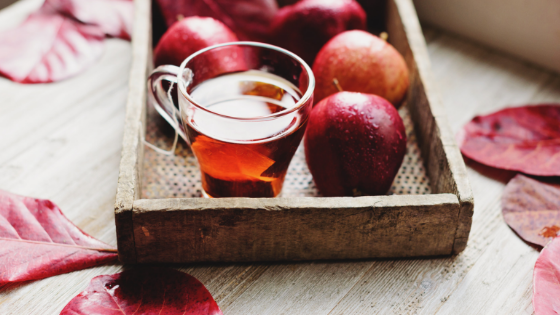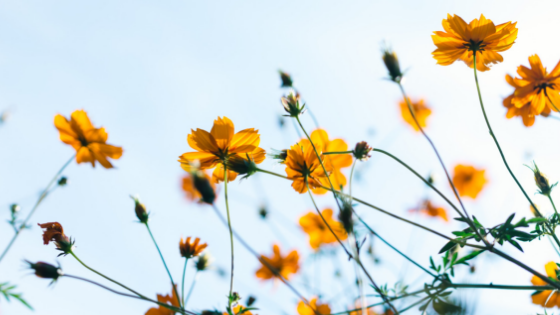What does spring mean for you? Warmer weather and beautiful blooms …or spring allergies?
Sneezing, congestion, runny nose, itchy throat, and irritated eyes. Allergies aren’t fun and can put a real dampener on the change of the seasons.
Rather than reach for over the counter medication, I prefer to turn to DIY remedies to treat symptoms naturally. I hope these tips on easy and natural ways to relieve spring allergies will inspire you to do the same!
Drink apple cider vinegar and lemon
Apple cider vinegar (ACV) is one of Mother Nature’s best natural tonics to prevent and treat many health concerns.
Apple cider vinegar is made from fermented apple cider. During the fermentation process, health-promoting probiotics and enzymes are formed.
It’s effective in relieving spring allergies as it supports lymphatic drainage and helps break up mucus.

How to make the apple cider vinegar remedy –
In a big glass of water, simply mix two tablespoons of ACV and 1 tablespoon of lemon juice. Drink this mixture three times a day to target spring allergy symptoms.
To make the taste a little more bearable, you can add a teaspoon of honey to the mixture too, which will also help soothe a sore throat.
Use eucalyptus oil
Essential oil therapies are wonderful for quickly reducing symptoms of spring allergies, particular eucalyptus oil.
Eucalyptus oil contains a compound called cineole which has been found to effectively treat sinus issues, relieving the symptoms of –
- Runny nose
- Headaches
- Blocked nose
Eucalyptus oil fights inflammation and relieves congestion. Plus the soothing, cooling feeling you feel when you breathe in eucalyptus is a welcome relief!
How to use eucalyptus oil
Eucalyptus is a super versatile oil which makes it easy to incorporate into your routine to beat spring allergies.
You can pop a few drops in a diffuser or a warm bath, use it as massage oil (be sure to blend it with a carrier oil first) or even deeply inhale the scent straight from the bottle or a few drops on a tissue.
Swap your morning coffee for a tea
Reaching for a strong brew of tea rather than coffee is a simple way to help combat your spring allergies. Not all teas are created equal though, so you’ll want to look out for the right type of tea to specifically target allergy symptoms.
A few great herbal teas I can recommend –
Chamomile, peppermint, and nettle. All three have been shown to reduce levels of histamine, relieving nasal and sinus issues.
If you really want to step up your defence against allergies though, I suggest drinking a herbal tea blend specifically to target spring allergy symptoms.
We have a wonderful herbal tea called Sinu, specifically blended for the relief of sinus including herbs that relieve common symptoms like itchy eyes, runny nose, scratchy throat, blocked and sore sinuses, and that mandatory sneezing!

Roll up your sleeves and give your home deep spring clean
According to the Washington Post, during the 1800s, spring was the time for the biggest cleaning ritual of the year because the winter left homes coated with “a layer of soot and grime in every room.”
We might not have thick layers of soot to deal with these days but a good spring clean can help banish some of the culprits responsible for triggering allergies.
Open windows and doors, shoes and clothes all bring pollen and other allergens inside.
Deep clean air vents and filters, vacuum carpets – or have them steam cleaned – and wipe down all surfaces, nooks, and crannies where dust and pollen can collect.
You’ll be rewarded with symptom relief and a sparkling home to greet the new season!
Turmeric
Is there no end to the health benefits of this incredible spice? Turmeric’s power is curcumin, a powerful active compound the spice contains which has been shown to reduce allergy symptoms.
The American College of Allergy, Asthma & Immunology published this study which found participants with allergic rhinitis reported their sneezing and congestion symptoms were alleviated after taking curcumin for two months.
How to take turmeric
It’s easy to include Turmeric in your diet; you can take it as a pill, in a tea, tinctures or cook with it. Try adding turmeric to rice, sprinkling it over roasted veggies, adding it to scrambled eggs or including it in a hearty soup.
Personally, I think drinking turmeric as a hot tea, in combination with ginger and honey is a wonderfully soothing way to reap its anti-inflammatory benefits. Taken as a tea it provides that feeling of well being we all need when feeling stuffy, congested and not ourselves.
Garlic
The humble garlic clove could be the answer to your dripping nose, itchy eyes and a sneeze that just won’t leave!
Garlic is an antihistamine superfood and natural decongestant, making it an excellent natural remedy for sinus pressure spring allergy symptoms.
Allergens are free radical cells that send the immune system crazy and trigger allergy symptoms. Garlic supports the immune system, boosting its strength to fight off free radical attacks and remove free radical cells from the bloodstream naturally.
How to make a garlic and honey syrup
The most potent way to take garlic is the raw way! Chop up 3 garlic cloves and mix them with a tablespoon of honey to form a thick syrup with garlic chunks. Swallow down the mixture 3 times a day and your allergy symptoms will begin to clear.

Load your plate up with foods high in vitamin C and quercetin
Eat your way to an allergy-free spring with foods containing vitamin C and quercetin, a plant flavonol.
Both are natural anti-histamines and piling your plate high with foods that contain them is a natural and healthy way to strengthen your body’s immunity to fight off spring allergies.
Foods include –
Leafy veg, broccoli, citrus fruit, green tea, red wine, onions, peppers, red onion, berries, apples, peaches, asparagus, cantaloupe, cayenne pepper, green onions, black-eyed peas, green peas, sweet potatoes, tomatoes, new potatoes, lettuce, bananas, kiwi – to name a few!
Foods rich in vitamin C and quercetin should be eaten as soon as possible when fresh or lightly cooked. They lose their potency after being processed, boiled, or stored for long periods of time.
My final word on spring allergies…..
If you’re a spring allergy sufferer it’s important to start earlier with preventative methods and changes to diet to keep things in check, rather than wait until the spring sneeze starts.
You can read more of my tips, including washing your nostrils, on natural ways of managing spring allergies and hayfever here.
Or, if you have some of your own suggestions to share, I’d love to read them in the comments below!
Deb x
